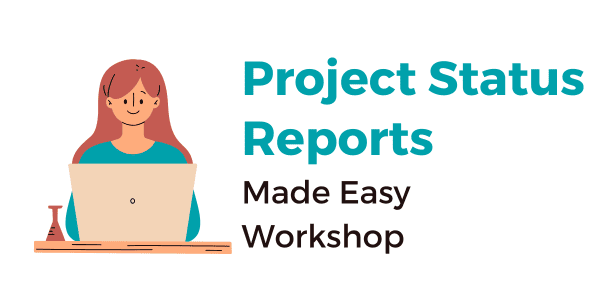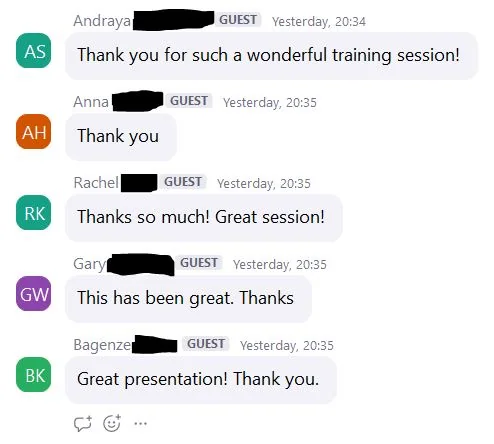Project Status Reports Made Easy: Training
Project communication and working with stakeholders are the things I’m most interested in from the big wide world of project management – I even wrote a book about it.
As project managers, we spend around 80% of our time communicating in one form or another, and status reporting, or regular project reporting, is a chunk of that.
Is project reporting your favourite part of the week?
Thought not.

I know it might feel like a niche subject but project reporting is a big deal for me because it’s one of the best ways to communicate about your project. It’s where you can:
- fully control the message
- be transparent
- ask for decisions and help
- impress stakeholders and build confidence and credibility
- remind people what’s not going well and what is being done about it
- set expectations
- celebrate wins
and so much more!
On 22 April 2025, I offered a training session specifically focused on making sure your reports get read and that stakeholders take action. It is now available as a replay.
If:
- You want to spend less time reporting all the stuff that has happened and gone and more time working on your project
- You are fed up with your sponsor and other stakeholders saying that they don’t know what’s going on, even if you are giving them plenty of information.
- You just feel that reporting on your project shouldn’t be this much of a headache!
Then this online training is going to be perfect for you.
Want to make project reporting easier? That’s what this training is designed to do!
It includes:
- Project report templates in PowerPoint, Excel and Word
- Ebook on project reporting
- Multi-project combined template in Excel and Word
- And some other goodies!
Cost: US$20 / £16
The challenge with project reporting is that each company has different rules and approaches (or sometimes no standardization at all). In practice, what you do from one organization to the next might be different, which is perhaps why so much of what you read is vague and generic.
However, there are some fundamental principles and basic good practices that you can implement on any project.
And as this is a topic that comes up time and time again in my mentoring calls, I’ve put together a one-off training session about it.
After you’ve watched the training, you’ll know:
- How to get people to contribute information for the report
- What to focus on so your reports are meaningful and useful
- How to understand what stakeholders need and how to give it to them
- The basics that must be right so stakeholders pay attention
- The proper way to use RAG statuses.

Why learn with me?
I’m the author of several project management books, including Shortcuts to Success and Managing Multiple Projects, and I’ve been leading business and tech projects for over 20 years. I’m an APM Fellow and a mentor, and I still work as a practitioner alongside my writing and training.
Buy now
Prefer to pay in UK Sterling? Do that here.
What past students say


FAQ
Here are some FAQ to help you decide if it’s the right training for you.
What’s the time commitment?
Overall, the time commitment is about an hour, plus any extra time to work through the templates and other resources.
What’s the background of participants?
Most of the people who have taken the course are early or mid-career professionals working in project delivery/project management roles.
Normally, at my courses, we get a good mix of people at various stages in their careers and from different industries.
What about if I work in an Agile team?
We talk about weekly and monthly project reports that project managers have to create from templates or within their project management software.
We don’t talk about burndown charts, information radiators, or other
If you work in an
However, the concepts of what makes a good report, how to share bad news, engaging stakeholders for decision making, and so on are good fundamentals for anyone involved in project work.
The good thing is that project reporting skills are transferable into lots of scenarios, so even if you don’t need them on this project, you might need them on a future project.
Can I claim PDUs?
Yes. I will give you an attendance certificate that you can use as evidence for your portfolio. However, I am not a registered PMI authorized trainer.
Can I claim the cost through my company?
Yes. Get in touch and I can send you an invoice.
When will you be running this training live again?
Not this year. I’m not sure yet what my training schedule looks like for next year.
